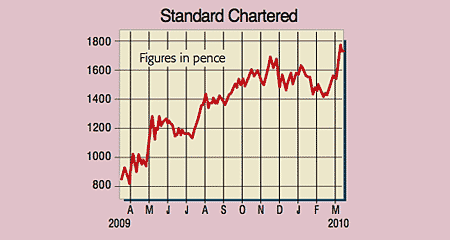
Given that trillions of dollars of bad debts still need to be absorbed by the financial system, how are the banks raking in money? In short, they make profits by managing four key risk areas: interest rates, liquidity, credit quality and geopolitics. And over the past 12 months all of these have moved massively in their favour.
Notably, record low borrowing costs and government stimulus packages have helped reduce asset write-downs and lift profit margins. But don’t be fooled. These incredibly benign conditions will not last for long, especially if there is a sovereign debt default or a spike in inflation.
So where does that leave Standard Chartered, whose shares have nearly tripled since the March 2009 lows? Most of Standard’s $202bn loan book is based on emerging markets (such as Asia, Africa and the Middle East). So it has gained hugely from the improved economic outlook in its main markets of India, Hong Kong, Singapore and Korea. But what happens when the stimulus measures are withdrawn? Exports will drop like a stone once again, triggering sharp GDP contractions and a deluge in new asset write-offs.
In fact, I’m sure this was the main reason for Standard Chartered’s £2.8bn of equity issues over the past 18 months. The board had to rebuild the capital base before the next wave of debt defaults strikes home. And even this cash infusion may not be sufficient, particularly if there is a repeat of the 1998 Asian Crisis, when losses rocketed to three-times current levels.
Standard Chartered (LSE: STAN), tipped as a BUY by RBS
Given this murky backdrop, why is the stock trading on an expensive 2010 p/e of 14 and a price/book-value ratio of 1.8 – both significantly above its peers? I suspect some investors are kidding themselves that emerging markets are now less risky. And thanks to the sudden bounce in the banking index, many previously underweight fund managers have had to quickly cover their short positions and jump back on board – thus sustaining the rally past justifiable levels.
True, Standard Chartered has escaped much of the sub-prime carnage, but with Asia likely to incur another round of export declines, I would argue the worst is still to come.
The group is also exposed to foreign-currency swings, geopolitical risks in many of its frontier territories, and a lot of tough new regulation. All in all, I would value the firm at 1.2 times net assets or around £11 per share. The next trading update is due out on 7 May.
Readers may also like to note that my views on Standard Chartered also apply to Prudential’s proposed $35.5bn acquisition of AIG Asia. The racy multiple of 1.7 embedded value looks far too expensive. I advise shareholders to vote against the deal and associated $20bn rights issue.
Recommendation: SELL at £17.84
• Paul Hill also writes a weekly share-tipping newsletter, Precision Guided Investments